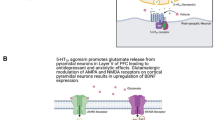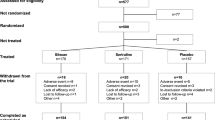Abstract
Rationale
Patients with frontal variant frontotemporal dementia (fvFTD) present with disinhibition, impulsiveness, apathy, altered appetite and stereotypic behaviors. A non-randomized clinical trial found improvement in these symptoms after treatment with a selective serotonin reuptake inhibitor (SSRI).
Objectives
We aimed to subject a SSRI, paroxetine, to a more rigorous test of its efficacy using a double-blind, placebo-controlled experimental design.
Methods
Ten subjects meeting the consensus criteria for FTD were entered into a double-blind, placebo-controlled crossover trial. Doses of paroxetine were progressively increased to 40 mg daily. The same regimen was used for placebo capsules. Subjects were assessed with a battery of cognitive tests in the sixth week of paroxetine and placebo treatment. At each assessment, caregivers were interviewed using the Neuropsychiatric Inventory and asked to complete the Cambridge Behavioral Inventory.
Results
There were no significant differences on the Neuropsychiatric Inventory or the Cambridge Behavioral Inventory. Paroxetine caused a decrease in accuracy on the paired associates learning task, reversal learning and a delayed pattern recognition task. There were no changes on the decision-making task, in spatial span, spatial recognition, spatial working memory, digit span and verbal fluency.
Conclusions
This study finds no evidence for the efficacy of paroxetine in the treatment of fvFTD. The results suggest that a chronic course of paroxetine may selectively impair paired associates learning, reversal learning and delayed pattern recognition. This pattern of deficits closely resembles that seen after tryptophan depletion. Results are discussed with respect to current theories on serotonergic modulation of orbitofrontal/ventromedial prefrontal cortex.



Similar content being viewed by others
References
Bechara A, Damasio H, Damasio AR, Lee GP (1999) Different contributions of the human amygdala and ventromedial prefrontal cortex to decision-making. J Neurosci 19:5473–5481
Benton AL (1968) Differential behavioural effects in frontal lobe disease. Neuropsychologia 6:53–60
Blier P, de Montigny C (1998) Possible serotonergic mechanisms underlying the antidepressant and anti-obsessive-compulsive disorder responses. Biol Psychiatry 44:313–323
Blier P, de Montigny C (1999) Serotonin and drug-induced therapeutic responses in major depression, obsessive-compulsive and panic disorders. Neuropsychopharmacology 21:91S–98S
Bozeat S, Gregory CA, Ralph MA, Hodges JR (2000) Which neuropsychiatric and behavioural features distinguish frontal and temporal variants of frontotemporal dementia from Alzheimer’s disease? J Neurol Neurosurg Psychiatry 69:178–186
Cummings JL, Mega M, Gray K, Rosenberg-Thompson S, Carusi DA, Gornbein J (1994) The Neuropsychiatric Inventory: comprehensive assessment of psychopathology in dementia. Neurology 44:2308–2314
Dolan M, Anderson IM, Deakin JF (2001) Relationship between 5-HT function and impulsivity and aggression in male offenders with personality disorders. Br J Psychiatry 178:352–359
Downes JJ, Roberts AC, Sahakian BJ, Evenden JL, Morris RG, Robbins TW (1989) Impaired extra-dimensional shift performance in medicated and unmedicated Parkinson’s disease: evidence for a specific attentional dysfunction. Neuropsychologia 27:1329–1343
Elliott R, Sahakian BJ, Matthews K, Bannerjea A, Rimmer J, Robbins TW (1997) Effects of methylphenidate on spatial working memory and planning in healthy young adults. Psychopharmacology 131:196–206
Fowler KS, Saling MM, Conway EL, Semple JM, Louis WJ (1995) Computerized delayed matching to sample and paired associate performance in the early detection of dementia. Appl Neuropsychol 2:72–78
Gregory CA (1999) Frontal variant of frontotemporal dementia: a cross-sectional and longitudinal study of neuropsychiatric features. Psychol Med 29:1205–1217
Gregory CA, Serra-Mestres J, Hodges JR (1999) Early diagnosis of the frontal variant of frontotemporal dementia: how sensitive are standard neuroimaging and neuropsychologic tests? Neuropsychiatry Neuropsychol Behav Neurol 12:128–135
Grundman M, Corey-Bloom J, Thal LJ (1998) Perspectives in clinical Alzheimer’s disease research and the development of antidementia drugs. J Neural Transm Suppl 53:255–275
Hodges JR, Miller B (2001) The classification, genetics and neuropathology of frontotemporal dementia. Introduction to the special topic papers: part I. Neurocase 7:31–35
Joyce EM, Robbins TW (1991) Frontal lobe function in Korsakoff and non-Korsakoff alcoholics: planning and spatial working memory. Neuropsychologia 29:709–723
Levy ML, Miller BL, Cummings JL, Fairbanks LA, Craig A (1996) Alzheimer disease and frontotemporal dementias. Behavioral distinctions. Arch Neurol 53:687–690
Manes F, Sahakian B, Clark L, Rogers R, Aitken M, Robbins T (2002) Decision-making processes following damage to the prefrontal cortex. Brain 125:624–639
Mann JJ (1999) Role of the serotonergic system in the pathogenesis of major depression and suicidal behavior. Neuropsychopharmacology 21:99S–105S
Mavaddat N, Kirkpatrick PJ, Rogers RD, Sahakian BJ (2000) Deficits in decision-making in patients with aneurysms of the anterior communicating artery. Brain 123:2109–2117
McKeith I, Del Ser T, Spano P, Emre M, Wesnes K, Anand R, Cicin-Sain A, Ferrara R, Spiegel R (2000) Efficacy of rivastigmine in dementia with Lewy bodies: a randomised, double-blind, placebo-controlled international study. Lancet 356:2031–2036
Milner B (1964) Effects of different brain lesions on card sorting. Arch Neurol 9:100–110
Montgomery SA (1996) Long-term management of obsessive-compulsive disorder. Int Clin Psychopharmacol 11[Suppl 5]:23–29
Moretti R, Torre P, Antonello RM, Cazzato G, Bava A (2003) Frontotemporal dementia: paroxetine as a possible treatment of behavior symptoms. A randomized, controlled, open 14-month study. Eur Neurol 49:13–19
Neary D, Snowden JS, Gustafson L, Passant U, Stuss D, Black S, Freedman M, Kertesz A, Robert PH, Albert M, Boone K, Miller BL, Cummings J, Benson DF (1998) Frontotemporal lobar degeneration: a consensus on clinical diagnostic criteria. Neurology 51:1546–1554
Neary D, Snowden JS, Mann DM (2000) Classification and description of frontotemporal dementias. Ann New York Acad Sci 920:46–51
Orrell MW, Sahakian BJ (1991) Dementia of frontal lobe type (editorial). Psychol Med 21:553–556
Owen AM, Downes JJ, Sahakian BJ, Polkey CE, Robbins TW (1990) Planning and spatial working memory following frontal lobe lesions in man. Neuropsychologia 28:1021–1034
Park SB, Coull JT, McShane RH, Young AH, Sahakian BJ, Robbins TW, Cowen PJ (1994) Tryptophan depletion in normal volunteers produces selective impairments in learning and memory. Neuropharmacology 33:575–588
Perry RJ, Hodges JR (1999) Attention and executive deficits in Alzheimer’s disease. A critical review. Brain 122:383–404
Plaisted KC, Sahakian BJ (1997) Dementia of the frontal lobe type-living in the here and now. Aging Mental Health 1:293–295
Rahman S, Sahakian BJ, Hodges JR, Rogers RD, Robbins TW (1999) Specific cognitive deficits in mild frontal variant frontotemporal dementia. Brain 122:1469–1493
Ratnavalli E, Brayne C, Dawson K, Hodges JR (2002) The prevalence of frontotemporal dementia. Neurology 58:1615–1621
Robbins TW (2000) Chemical neuromodulation of frontal-executive functions in humans and other animals. Exp Brain Res 133:130–138
Rogers RD, Robbins TW (2001) Investigating the neurocognitive deficits associated with chronic drug misuse. Curr Opin Neurobiol 11:250–257
Rogers RD, Blackshaw AJ, Middleton HC, Matthews K, Hawtin K, Crowley C, Hopwood A, Wallace C, Deakin JF, Sahakian BJ, Robbins TW (1999a) Tryptophan depletion impairs stimulus-reward learning while methylphenidate disrupts attentional control in healthy young adults: implications for the monoaminergic basis of impulsive behaviour. Psychopharmacology 146:482–491
Rogers RD, Everitt BJ, Baldacchino A, Blackshaw AJ, Swainson R, Wynne K, Baker NB, Hunter J, Carthy T, Booker E, London M, Deakin JF, Sahakian BJ, Robbins TW (1999b) Dissociable deficits in the decision-making cognition of chronic amphetamine abusers, opiate abusers, patients with focal damage to prefrontal cortex, and tryptophan-depleted normal volunteers: evidence for monoaminergic mechanisms. Neuropsychopharmacology 20:322–339
Rubinsztein JS, Rogers RD, Riedel WJ, Mehta MA, Robbins TW, Sahakian BJ (2001) Acute dietary tryptophan depletion impairs maintenance of “affective set” and delayed visual recognition in healthy volunteers. Psychopharmacology 154:319–326
Sahakian BJ, Morris RG, Evenden JL, Heald A, Levy R, Philpot M, Robbins TW (1988) A comparative study of visuospatial memory and learning in Alzheimer-type dementia and Parkinson’s disease. Brain 111:695–718
Smith TD, Kuczenski R, George-Friedman K, Malley JD, Foote SL (2000) In vivo microdialysis assessment of extracellular serotonin and dopamine levels in awake monkeys during sustained fluoxetine administration. Synapse 38:460–470
Sparks DL, Markesbery WR (1991) Altered serotonergic and cholinergic synaptic markers in Pick’s disease. Arch Neurol 48:796–799
Swartz JR, Miller BL, Lesser IM, Darby AL (1997) Frontotemporal dementia: treatment response to serotonin selective reuptake inhibitors. J Clin Psychiatry 58:212–216
Acknowledgements
Funding was provided by a Wellcome Trust programme grant (019407) to Prof. T.W. Robbins, Prof. B.J. Everitt, Dr. A.C. Roberts and Prof. B.J. Sahakian and carried out within a MRC Center for Behavioural and Clinical Neuroscience. J.B.D. was funded by Merck Sharp and Dohme, a James Baird Award from the University of Cambridge School of Clinical Medicine and an Oon Khye Beng studentship. S.R. was funded by the MRC and the James Baird Fund. John Hodges funding was provided by a MRC program grant. The authors would like to thank Dr. S. Bozeat for help with collecting the data, Dr. M. Aitken for statistical advice and Prof. Robbins for his comments on the results.
Author information
Authors and Affiliations
Corresponding author
Rights and permissions
About this article
Cite this article
Deakin, J.B., Rahman, S., Nestor, P.J. et al. Paroxetine does not improve symptoms and impairs cognition in frontotemporal dementia: a double-blind randomized controlled trial. Psychopharmacology 172, 400–408 (2004). https://doi.org/10.1007/s00213-003-1686-5
Received:
Accepted:
Published:
Issue Date:
DOI: https://doi.org/10.1007/s00213-003-1686-5




